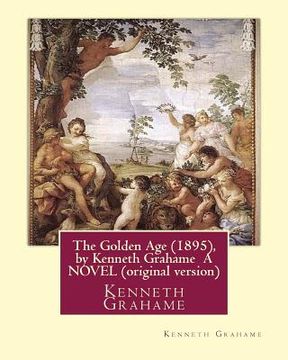The Golden Age (1895), by Kenneth Grahame A NOVEL (original version): Kenneth Grahame ( 8 March 1859 - 6 July 1932) was a British writer (en Inglés)
Reseña del libro "The Golden Age (1895), by Kenneth Grahame A NOVEL (original version): Kenneth Grahame ( 8 March 1859 - 6 July 1932) was a British writer (en Inglés)"
The Golden Age is a collection of reminiscences of childhood, written by Kenneth Grahame and originally published in book form in 1895, in London by The Bodley Head, and in Chicago by Stone & Kimball. (The Prologue and six of the stories had previously appeared in the National Observer, the journal then edited by William Ernest Henley.) Widely praised upon its first appearance - Algernon Charles Swinburne, writing in the Daily Chronicle, called it "one of the few books which are well-nigh too praiseworthy for praise" the book has come to be regarded as a classic in its genre. Typical of his culture and his era, Grahame casts his reminiscences in imagery and metaphor rooted in the culture of Ancient Greece; to the children whose impressions are recorded in the book, the adults in their lives are "Olympians," while the chapter titled "The Argonauts" refers to Perseus, Apollo, Psyche, and similar figures of Greek mythology. Grahame's reminiscences, in The Golden Age and in the later Dream Days (1898), were notable for their conception "of a world where children are locked in perpetual warfare with the adult 'Olympians' who have wholly forgotten how it feels to be young" a theme later explored by J. M. Barrie and other authors. The original English and American editions of the book were printed without illustrations. A later edition, published in Britain and America in 1899 by The Bodley Head, featured black-and-white artwork by Maxfield Parrish - nineteen full-page illustrations and twelve tailpieces. The full-page pictures accompany the eighteen chapters of the book, plus a frontispiece.A 1915 edition contains 19 full-page colour illustrations by R J Enraght-Moony. In 1928, an edition illustrated by EH Shepard was brought out. Kenneth Grahame ( 8 March 1859 - 6 July 1932) was a British writer, most famous for The Wind in the Willows (1908), one of the classics of children's literature. He also wrote The Reluctant Dragon; both books were later adapted into Disney films. Kenneth Grahame was born on 8 March (1859) in Edinburgh, Scotland. When he was a little more than a year old, his father, an advocate, received an appointment as sheriff-substitute in Argyllshire at Inveraray on Loch Fyne. Kenneth loved the sea and was happy there, but when he was 5, his mother died from complications of childbirth, and his father, who had a drinking problem, gave over care of Kenneth, his brother Willie, his sister Helen and the new baby Roland to Granny Ingles, the children's grandmother, in Cookham Dean in the village of Cookham in Berkshire. There the children lived in a spacious, if dilapidated, home, "The Mount", on spacious grounds in idyllic surroundings, and were introduced to the riverside and boating by their uncle, David Ingles, curate at Cookham Dean church. This delightful ambiance, particularly Quarry Wood and the River Thames, is believed, by Peter Green, his biographer, to have inspired the setting for The Wind in the Willows.He was an outstanding pupil at St Edward's School in Oxford. During his early years at St. Edwards, a sports regimen had not been established and the boys had freedom to explore the old city with its quaint shops, historic buildings, and cobblestone streets, St Giles' Fair, the idyllic upper reaches of the River Thames, and the nearby countryside. Grahame died in Pangbourne, Berkshire, in 1932. He is buried in Holywell Cemetery, Oxford. Grahame's cousin Anthony Hope, also a successful author, wrote his epitaph, which reads: "To the beautiful memory of Kenneth Grahame, husband of Elspeth and father of Alastair, who passed the river on the 6th of July, 1932, leaving childhood and literature through him the more blest for all time"....

